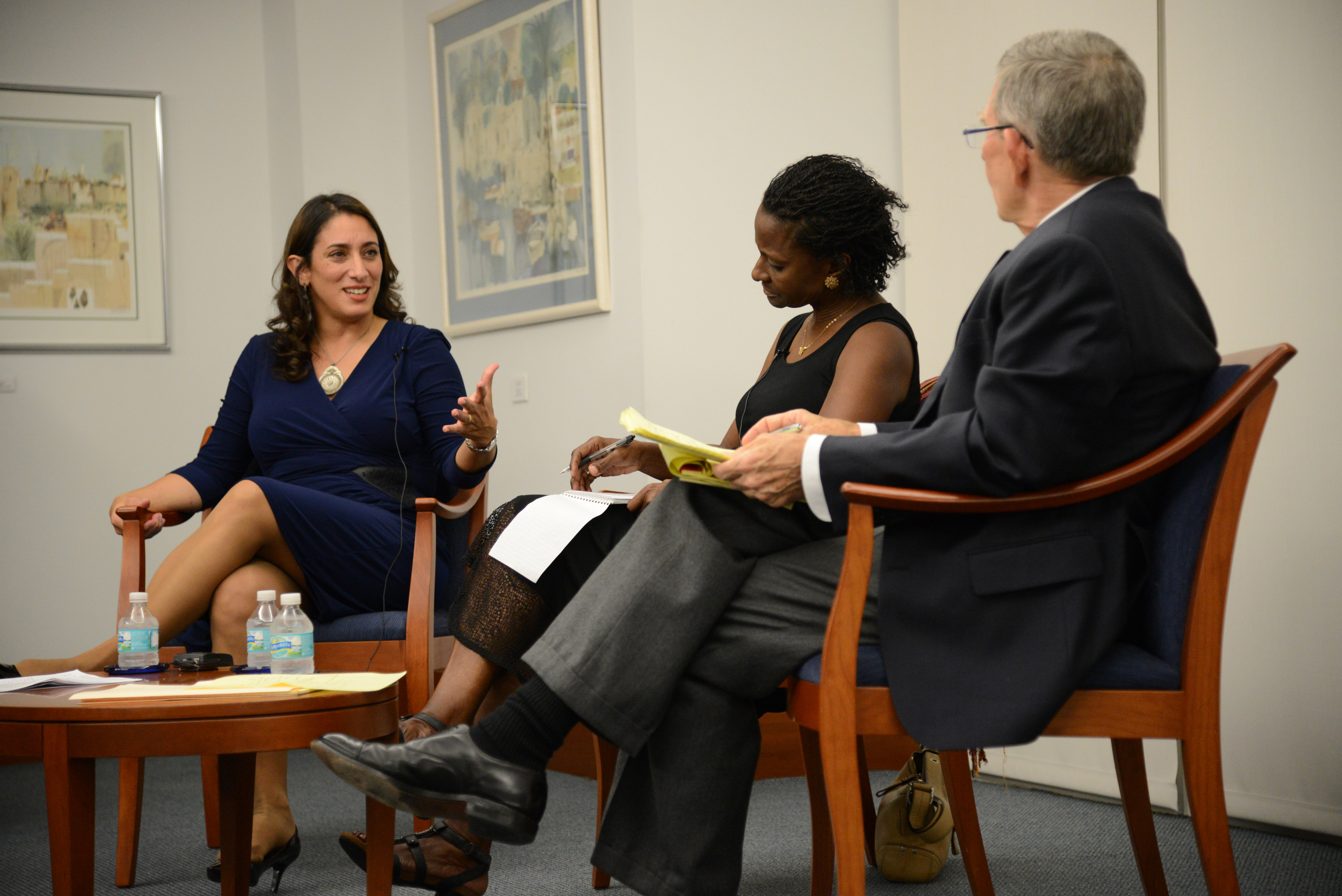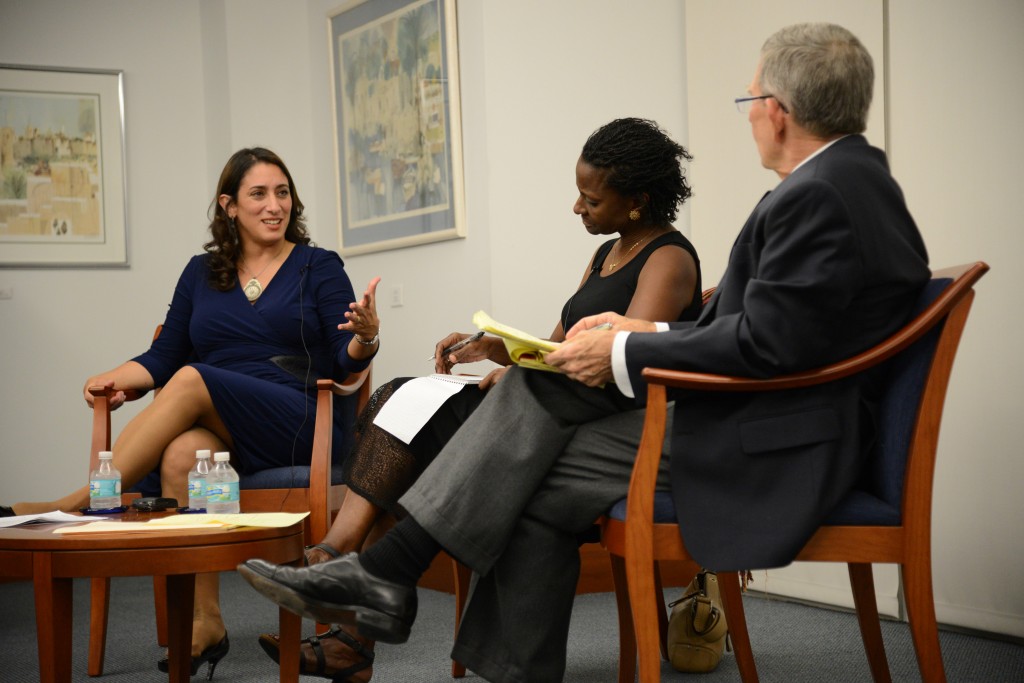

Author and journalist Ilene Prusher visited the Sue and Leonard Miller Center for Judaic Studies on Wednesday to speak about the issue of journalists being targeted by terrorist organizations such as ISIS and Al-Qaeda.
Prusher once edited the work of Steven Sotloff, who was executed by ISIS in September, and covered the wars in Iraq and Afghanistan for the Christian Science Monitor. Her book, “Baghdad Fixer,” is being released in the United States this month.
The University of Miami’s student media had a chance to sit down and speak with Prusher before the event.
Student Media: So, a journalist as a target. What do you mean by that? How has the role of journalists changed recently?
Ilene Prusher: Well, I think certainly being a foreign correspondent, if you’re going to go to conflict zones, has always involved some degree of risk. That’s not new. Certainly through different conflicts over the last century there have been times when journalists have been injured or killed, but it’s more often been killed in the crossfire, caught in the wrong place at the wrong time.
I would say that in the last 10 plus years since the war in Iraq, and also a bit starting from the start of U.S. involvement in Afghanistan, that western journalists have increasingly become a target. And you know ISIS, in just these last few months, has taken this to an entirely new level by essentially executing innocent western journalists on video.
I think there’s an old saying, and its kind of cliche, “don’t shoot the messenger,” but that is essentially what we as journalists try to convey to people when working in conflict zones, we’re saying use us… I am your conduit in getting your message out to the world and I’m here to report the story as fairly as you can, but that message is being lost on people who have such an extreme ideology that there’s really no convincing them that, you know, I came here to report what’s happening in this country.
Steven Sotloff and James Foley were both freelancers who were working in Syria who really went with the intention of conveying a picture of what’s happening in one of the most devastating conflicts of our time…Instead of shedding light they’ve had their blood shed.
It’s really a tragic situation because I think we as journalists have a crucial role to play in what’s happening.
SM: Do you think a lot of that has to do with them being so vulnerable over there? Especially with ISIS in Syria, western governments aren’t fully involved there…or do you think there’s a factor of organizations like ISIS having a hatred towards western media?
IP: I think it’s probably a bit of both of those. Even when U.S. military was fully present in Iraq, journalists were getting kidnapped for awhile in Baghdad, almost on a weekly basis, including some friends of mine…I think the journalists, and particularly people who work as print journalists, and by that I mean they’re not working with an entire crew, and so there’s less of a team aspect …You usually will have a translator, a fixer as we call it, and a driver, but essentially you’re a one man or woman show and therefore you are quite vulnerable… There has a been a big debate about this – whether journalists should go out with more security detail and not be working so independently, but the truth is a lot of people feel that if you do that, and you’re obviously with a guard or a gunman, that you’re going to attract more attention and look more like a target.
SM: We see terrorism every day in the news…what is it like as a journalist to come face to face with such a pure evil? How do you cope with that?
IP: Well, one of the things about terrorism…is that, when I see innocent people being killed anywhere in the world, I am quick to say when it’s a terrorist incident that it’s a terrorist incident, but I think one of the mistakes we sometimes make is the thinking that people who are involved in different terrorist organizations are simply full of hatred and pure evil, and it paints a picture that’s almost hopeless. I think in a lot of cases it’s worth studying what’s behind the violent and indefensible behavior that comes out of groups like ISIS, or Hamas, or Hezbollah or a number of groups because I think that sometimes …leaders around the world can sometimes make the mistake of simply saying, ‘They’re terrorists and we don’t negotiate with them and we don’t want to justify anything that they do,’ and I certainly don’t want to justify anything they do, but I think that people have an agenda. There’s an agenda behind the violence. There’s an ideology behind the violence. Sometimes it’s quite twisted, sometimes it’s beyond what you or I, or the average person in the U.S. could understand, but it doesn’t exist in a vacuum; it exists because of all sorts of factors that are occurring throughout the Middle East and sometimes it’s in reaction to foreign policy…so I suppose I try to put it in some perspective of not just how terrible it is that this is happening, but why is this happening now and why is someone attracted to this extreme ideology?
SM: Some European nations, obviously not the U.S. and U.K. due to their policy toward hostages and not paying ransoms…will pay the ransoms to get their journalists or activists freed from ISIS or others organizations. Is it hard to see other countries paying the ransoms while U.S. journalists and captives are still held and eventually killed?
IP: I think it’s very difficult and it’s a very difficult ethical issue… I think it’s very difficult to be in the position of either the family of the captive, or the newspaper of the captive, who just wants that person to come home safe and sound. So I don’t know what the bottom line on this should be. One of the difficult things is, and it is murky territory, and your question is quite pertinent right now because we know from a recent New York Times investigation, from about a week and a half ago, from which we know that ISIS was holding about 23 foreign captives, and one by one it let the Europeans go, in all kinds of ransom deals from what we understand, and the Americans and British citizens have gradually been executed, and so it’s quite troubling. I don’t know if I would envy Secretary Kerry or President Obama to be sitting in the position that they sit in to try to say, ‘Should we reconsider this policy?’






